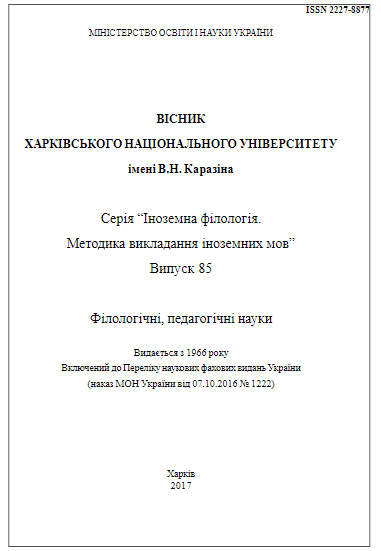Прагматика навчальних мов і навчання іноземної мови з орієнтацією на компетенцію
Ключові слова:
навчання мови, когнітивний підхід, компетенція, прагматика, навчальні мови
Анотація
У статті розглянуто теоретичні аспекти навчання використанню іноземної мови в різних соціальних ситуаціях і умовах. З позицій когнітивного підходу до вивчення мови у статті виокремлюються міжкультурні аспекти навчання мови, що стосуються сфери міжмовної прагматики, яка вивчає використання й придбання прагматичних знань цільової мови не-носіями. Потім розглядаються теоретичні питання впровадження орієнтованих на учня методів з метою досягнення оптимальної прагматичної обізнаності й компетенції.Завантаження
##plugins.generic.usageStats.noStats##
Посилання
Bachman, L.F., & Palmer, A.S. (1996). Language Testing in Practice: Designing and Developing Useful Language Tests. Oxford: Oxford University Press.
Barron, A., & Schneider, K.P. (2009). Variational pragmatics: studying the impact of social factors on language use in interaction. Intercultural Pragmatics, 6(4), 425–442.
Bialystok, E. (1993). Symbolic representation and attentional control in pragmatic competence. In: Kasper, G., & Blum-Kulka, S. (Hrsg.). Interlanguage Pragmatics. New York & Oxford: Oxford University Press, pp. 43–57.
Demme, S. (2010). Der Transfer/Die Transferenz. In: H. Barkowski & H.J. Krumm (Hrsg.). Fachlexikon Deutsch als Fremd- und Zweitsprache. Tübingen & Basel: A. Francke Verlag, S. 343.
Freudenberg-Findeisen, R. (2010). Der Sprechakt. In: H. Barkowski & H.J. Krumm (Hrsg.). Fachlexikon Deutsch als Fremd- und Zweitsprache. Tübingen & Basel: A. Francke Verlag, S. 315.
Kasper, G. (1992). Pragmatic Transfer. Second Language Research, 8(3), 203–231.
Kasper, G. (2001). Learning pragmatics in the L2 classroom. In: L.F. Bouton (ed.). Pragmatics and Language Learning Monograph Series, 10. Urbana: University of Illinois, pp. 1–25.
Kasper, G., & Rose, K.-R. (2001). Pragmatics in Language Teaching. In: G. Kasper & K.-R. Rose (Hrsg.). Pragmatics in Language Teaching. Cambridge: Cambridge University Press, pp. 1–10.
Kasper, G., & Rose, K.-R. (2002). Pragmatic Development in a Second Language. Oxford: Blackwell Publishers.
Kasper, G., & Schmidt, R. (1996). Developmental Issues in Interlanguage Pragmatics. Studies in Second Language Acquisition, 18, 149–169.
Krause, W.D. (2010). Linguistische Grundlagen der Analyse von Ergebnissen fremdsprachiger Kommunikationsprozesse. In: W.-D. Krause (Hrsg.). Das Fremde und der Text. Fremdsprachliche Kommunikation und ihre Ergebnisse. Potsdam: Universitätsverlag Potsdam, pp. 53–72.
Leech, G. (1983). Principles of Pragmatics. London and New York: Longman.
McLean, T. (2004). Giving Students a Fighting Chance: Pragmatics in the Language Classroom. Teaching English as Second Language Canada Journal, 21(2), 72–94.
Meibauer, J. (2008). Pragmatik. Eine Einführung (2. überab. Aufl.). Tübingen: Stauffenberg Verlag.
Rintell, E. (1981). Sociolinguistic variation and pragmatic ability: a look at learners. International Journal of Sociology and Language, 27, 11–34.
Selinker, L. (1972). Interlanguage. International review of Applied Linguistics, 10(3), 209–231.
Takahashi, S. (2010). Assessing learnability in second language pragmatics. In: A. Trosborg (ed.). Pragmatics across Languages and Cultures. Berlin: Mouton de Gruyter, pp. 391–422.
Thomas, J. (1983). Cross Cultural Pragmatic Failure. Applied Linguistics, 4(2), 91–112.
Yates, L. (2010). Pragmatic challenges for second language learners. In: A. Trosborg (ed.). Pragmatics across Languages and Cultures. Berlin: Mouton de Gruyter, pp. 287–309.
Barron, A., & Schneider, K.P. (2009). Variational pragmatics: studying the impact of social factors on language use in interaction. Intercultural Pragmatics, 6(4), 425–442.
Bialystok, E. (1993). Symbolic representation and attentional control in pragmatic competence. In: Kasper, G., & Blum-Kulka, S. (Hrsg.). Interlanguage Pragmatics. New York & Oxford: Oxford University Press, pp. 43–57.
Demme, S. (2010). Der Transfer/Die Transferenz. In: H. Barkowski & H.J. Krumm (Hrsg.). Fachlexikon Deutsch als Fremd- und Zweitsprache. Tübingen & Basel: A. Francke Verlag, S. 343.
Freudenberg-Findeisen, R. (2010). Der Sprechakt. In: H. Barkowski & H.J. Krumm (Hrsg.). Fachlexikon Deutsch als Fremd- und Zweitsprache. Tübingen & Basel: A. Francke Verlag, S. 315.
Kasper, G. (1992). Pragmatic Transfer. Second Language Research, 8(3), 203–231.
Kasper, G. (2001). Learning pragmatics in the L2 classroom. In: L.F. Bouton (ed.). Pragmatics and Language Learning Monograph Series, 10. Urbana: University of Illinois, pp. 1–25.
Kasper, G., & Rose, K.-R. (2001). Pragmatics in Language Teaching. In: G. Kasper & K.-R. Rose (Hrsg.). Pragmatics in Language Teaching. Cambridge: Cambridge University Press, pp. 1–10.
Kasper, G., & Rose, K.-R. (2002). Pragmatic Development in a Second Language. Oxford: Blackwell Publishers.
Kasper, G., & Schmidt, R. (1996). Developmental Issues in Interlanguage Pragmatics. Studies in Second Language Acquisition, 18, 149–169.
Krause, W.D. (2010). Linguistische Grundlagen der Analyse von Ergebnissen fremdsprachiger Kommunikationsprozesse. In: W.-D. Krause (Hrsg.). Das Fremde und der Text. Fremdsprachliche Kommunikation und ihre Ergebnisse. Potsdam: Universitätsverlag Potsdam, pp. 53–72.
Leech, G. (1983). Principles of Pragmatics. London and New York: Longman.
McLean, T. (2004). Giving Students a Fighting Chance: Pragmatics in the Language Classroom. Teaching English as Second Language Canada Journal, 21(2), 72–94.
Meibauer, J. (2008). Pragmatik. Eine Einführung (2. überab. Aufl.). Tübingen: Stauffenberg Verlag.
Rintell, E. (1981). Sociolinguistic variation and pragmatic ability: a look at learners. International Journal of Sociology and Language, 27, 11–34.
Selinker, L. (1972). Interlanguage. International review of Applied Linguistics, 10(3), 209–231.
Takahashi, S. (2010). Assessing learnability in second language pragmatics. In: A. Trosborg (ed.). Pragmatics across Languages and Cultures. Berlin: Mouton de Gruyter, pp. 391–422.
Thomas, J. (1983). Cross Cultural Pragmatic Failure. Applied Linguistics, 4(2), 91–112.
Yates, L. (2010). Pragmatic challenges for second language learners. In: A. Trosborg (ed.). Pragmatics across Languages and Cultures. Berlin: Mouton de Gruyter, pp. 287–309.
Опубліковано
2017-10-29
Як цитувати
Depner, G. (2017). Прагматика навчальних мов і навчання іноземної мови з орієнтацією на компетенцію. Вісник ХНУ імені В. Н. Каразіна. Серія: Іноземна філологія. Методика викладання іноземних мов, (85), 164-169. https://doi.org/10.26565/2227-8877-2017-85-24




